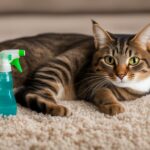Are you tired of your house smelling like a litter box? Don’t worry, I’ve got you covered! As a pet owner myself, I know how important it is to have a fresh-smelling home. That’s why I’ve compiled a list of efficient tips to help you eliminate those unwanted cat odors.
By following these simple steps, you can maintain cleanliness, properly groom your furry friend, and ensure that their accessories are clean. With a little effort, you can enjoy a cat-free odor environment in your home!
Key Takeaways:
- Maintain cleanliness by regularly cleaning your home and washing fabrics.
- Groom your pet regularly, including bathing, brushing, and nail clipping.
- Clean your pet’s accessories, such as bedding, toys, and litter box, on a weekly basis.
- Manage the litter box effectively by choosing the right litter, scooping daily, and placing it in a secluded area.
- Freshen up your home by airing it out, using air neutralizers, and protecting furniture from pet smells.
Regular Cleaning
Keeping your home clean is the key to getting rid of pet smells. Regular vacuuming, dusting, mopping, and washing fabrics are important cleaning tasks that can help combat the odor caused by pets. By incorporating these tasks into your cleaning routine, you can ensure that your home remains fresh and free from unpleasant smells.
When it comes to vacuuming, make sure to pay special attention to areas where your pets spend a lot of time, such as their favorite lounging spots or the corners of rooms. This will help remove any pet hair or dander that may be contributing to the odor. Additionally, dusting surfaces and washing fabrics, such as curtains or upholstery, can help eliminate lingering pet smells.
To further freshen up your home, consider using cleaning products specifically formulated to neutralize pet odors. These products can be found in pet stores or online and can be used on various surfaces, such as carpets, furniture, and pet bedding. By incorporating these products into your cleaning routine, you can effectively eliminate pet smells and create a clean and fresh environment in your home.
Remember, regular cleaning is essential in keeping your home smelling fresh and free from pet odors. By implementing a consistent cleaning routine and using products specifically designed for pet odor elimination, you can ensure a clean and pleasant-smelling home.
Grooming Your Pet
Ensuring that your furry friend is clean and well-groomed is essential for maintaining a fresh-smelling home. By frequently cleaning and grooming your pet, you can keep them looking and smelling their best. Regular grooming not only helps to minimize shedding and keeps your pet’s coat healthy, but it also helps to prevent odors from building up on their fur.
Grooming Techniques
When it comes to grooming your pet, there are a few key techniques to keep in mind. Regular bathing, brushing, nail clipping, and tooth brushing are all important aspects of maintaining your pet’s cleanliness. Bathing your cat or dog every few months, or as needed, using a gentle pet shampoo will help remove any odors that may have built up on their skin and fur. Brushing their coat regularly will help to remove loose hair and keep their fur smelling fresh. It’s also important to keep your pet’s nails trimmed to prevent them from scratching and causing unpleasant odors. Additionally, brushing your pet’s teeth regularly can help prevent bad breath and keep their oral hygiene in check.
Professional Grooming Services
If you find that grooming your pet at home is too challenging or time-consuming, consider taking them to a professional groomer. Professional groomers have the experience and tools necessary to ensure that your pet is groomed properly and thoroughly. They can provide services like nail trims, haircuts, and even specialty treatments to keep your pet looking and smelling great.
| Grooming Tips | Benefits |
|---|---|
| Regular brushing | Removes loose hair and prevents matting |
| Frequent bathing | Removes odors and keeps their coat clean |
| Nail trimming | Prevents scratching and potential infections |
| Regular tooth brushing | Helps maintain oral hygiene and prevents bad breath |
Grooming your pet not only helps to keep them looking their best but also plays a crucial role in keeping your home smelling fresh. By frequently cleaning and grooming your pet, you can ensure that they stay fresh and odor-free, making for a more enjoyable living environment for both you and your furry companion.
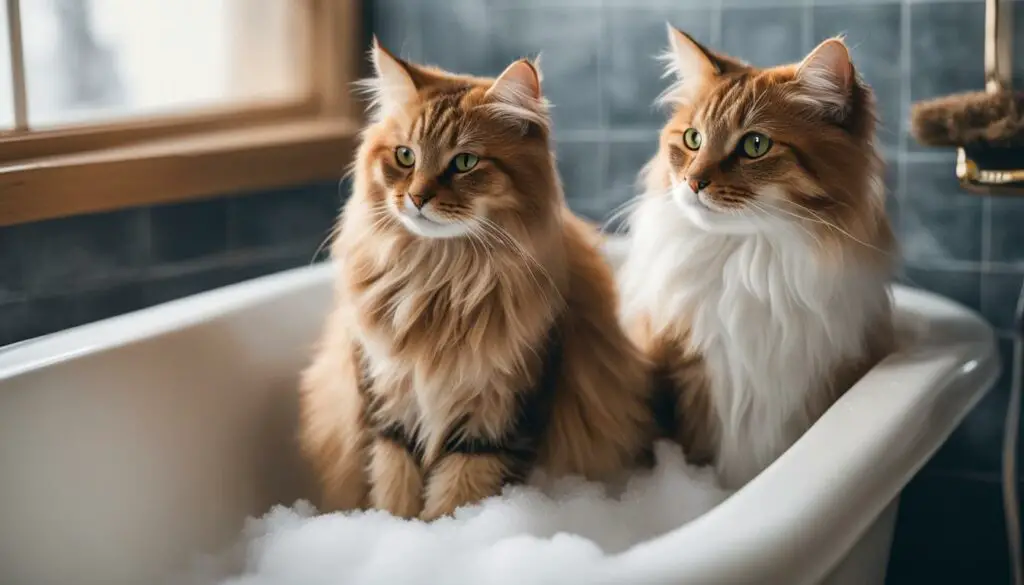
Cleaning Your Pet’s Accessories
When it comes to keeping your house free from the smell of your beloved cat, it’s not just about cleaning your pet, but also their accessories. Regularly cleaning your pet’s bedding, toys, dishes, cage, and litter box is essential to eliminate unwanted odors in your home. By incorporating weekly cleaning routines for these items, you can ensure a fresh and pleasant environment for both you and your furry friend.
To start, let’s focus on your pet’s bedding. Washing their beddings on a weekly basis helps remove any accumulated fur, dander, and odor that may have seeped into the fabric. Use pet-friendly detergents and follow the manufacturer’s instructions for best results.
Next, it’s time to give their toys some attention. Toys can easily collect dirt, saliva, and even urine, causing them to emit unpleasant odors. Depending on the material, you may be able to toss them in the washing machine or hand wash them using mild soap and warm water. Remember to thoroughly dry them to prevent mold or mildew from developing.
Don’t forget about your pet’s dishes! Just like human dishes, pet dishes need regular cleaning to prevent the growth of bacteria and the buildup of odors. Wash their bowls with hot soapy water after every meal, and consider investing in dishwasher-safe options for easy and convenient cleaning.
A clean cage is not only crucial for your pet’s well-being but also for odor control. Remove any soiled bedding or litter and wipe down the cage with pet-safe disinfectants. Allow it to completely dry before adding fresh bedding or litter.
Lastly, the litter box. Cleaning the litter box is a weekly must-do to keep your house smelling fresh. Remove the used litter, scrub the litter box with hot water and mild detergent, and rinse thoroughly. Add fresh litter and make sure to scoop out waste daily to further control odor.
By regularly cleaning your pet’s accessories, you can minimize unpleasant odors in your home and provide a clean and comfortable environment for both you and your furry friend.
Tips for Managing the Litter Box
Managing the litter box is crucial for keeping your home free from cat odors. By following these tips, you can ensure that your litter box is clean and odor-free, creating a pleasant environment for both you and your furry friend.
Litter Box Selection and Placement
Choosing the right litter box is the first step in managing cat odor. Opt for a well-sized box with high sides to prevent litter from being kicked out. Consider a covered litter box with a filter to further control odors. Place the litter box in a secluded area of your home, away from high-traffic areas and food bowls.
Choosing the Right Litter
Not all cat litters are created equal when it comes to odor control. Choose a litter that is specifically designed to neutralize smells, such as one with activated carbon or baking soda. Avoid scented litters as they may be overwhelming for your cat’s sensitive nose.
Regular Cleaning and Scooping
To prevent odors from building up, scoop the litter box at least once a day. Remove clumps and solid waste and dispose of them properly. Regularly replace the litter entirely to keep it fresh and clean. Cleaning the litter box frequently is essential for maintaining a odor-free environment.
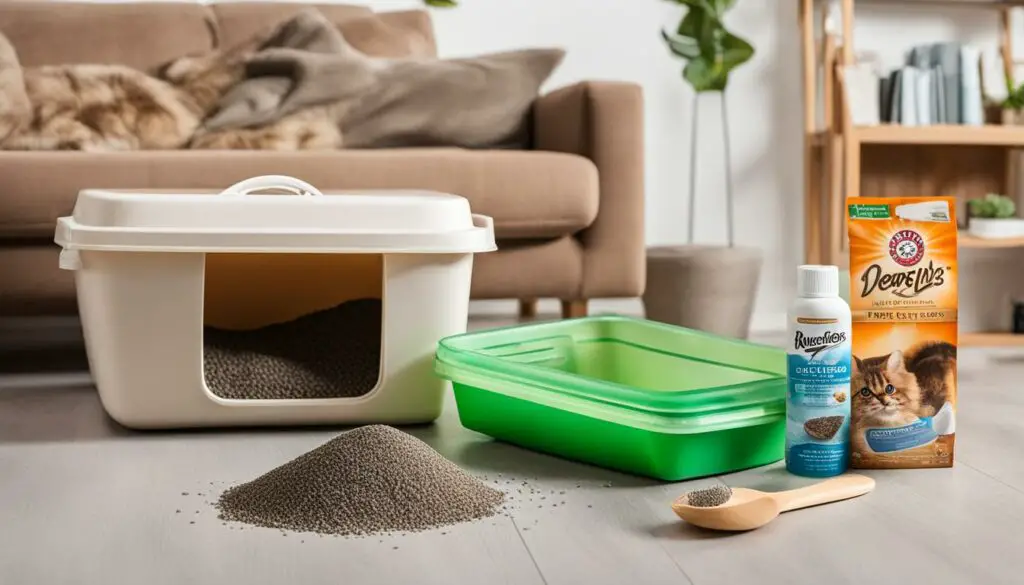
| Tips | Description |
|---|---|
| Add Baking Soda | Sprinkle a thin layer of baking soda in the litter box to help absorb odors. |
| Provide Multiple Litter Boxes | If you have multiple cats, ensure that each cat has their own litter box to prevent overcrowding and territorial issues. |
| Monitor Your Cat’s Diet | Avoid feeding your cat foods with strong odors, as this can contribute to smelly litter box odors. Consult with your veterinarian for advice on a balanced diet for your cat. |
By implementing these tips for managing the litter box, you can effectively control cat odors in your home. Remember to choose the right litter box, select an appropriate litter, clean and scoop regularly, and use additional odor-neutralizing measures such as baking soda. With proper litter box maintenance, you can create a fresh and inviting atmosphere for both you and your beloved feline companion.
Freshening Up Your Home
In order to keep your house smelling fresh and free from cat odors, there are several effective strategies you can implement. Airing out your house regularly is one of the simplest and most effective ways to eliminate unwanted smells. By opening windows and doors, you allow fresh air to circulate, helping to remove any lingering odors.
De-odorizing your floors is another important step in freshening up your home. Sprinkling baking soda on carpets before vacuuming can help absorb and neutralize odors. Additionally, using air neutralizers and masking scents can help to create a more pleasant atmosphere.
Changing filters in your HVAC system on a regular basis is also crucial for maintaining a fresh-smelling home. These filters can trap pet dander and other allergens, which can contribute to unpleasant smells. By keeping the filters clean, you can ensure that the air in your home remains fresh and odor-free.
| Ways to Freshen Up Your Home | Benefits |
|---|---|
| Airing out your house | Removes stagnant air and odors |
| De-odorizing floors | Neutralizes and absorbs odors |
| Using air neutralizers and masking scents | Creates a more pleasant atmosphere |
| Changing filters | Keeps the air fresh and odor-free |
| Protecting furniture | Prevents odors from being absorbed |
| Choosing rugs wisely | Easy to clean and maintain |
Furthermore, protecting your furniture from pet smells is essential. Using furniture covers or throws can help to prevent odors from being absorbed into the fabric, making it easier to keep your furniture smelling fresh.
Finally, choosing rugs wisely can also contribute to a fresher-smelling home. Opt for rugs that are easy to clean and maintain, as this will help to minimize pet odors. Additionally, consider using rugs with patterns or darker colors, as they can help to conceal any stains or dirt that may contribute to unwanted odors.

Summary
To keep your home smelling fresh and free from cat odors, it’s important to regularly air out your house, de-odorize your floors, use air neutralizers and masking scents, change filters in your HVAC system, protect your furniture, and choose rugs wisely. These simple steps can make a significant difference in maintaining a pleasant and odor-free living environment.
Sealing Up Odors
If you’ve tried all the usual methods of eliminating cat odors from your home to no avail, it may be time to consider sealing up those stubborn odors. Sealing floors and walls can be an effective solution in preventing the lingering smell of cats from permeating your living space. By creating a barrier between the odor source and the rest of your home, you can significantly reduce the impact of cat odors on your daily life.
One option for sealing floors and walls is to apply a specialized odor-sealing primer. This primer is designed to seal in any odors that may be trapped within the surfaces of your home. Simply apply the primer to the affected areas, following the manufacturer’s instructions, and allow it to dry. Once dry, you can proceed with painting or adding a new layer of flooring, effectively sealing in any remaining odors.
If you’re not comfortable tackling this job yourself or if you have particularly stubborn odors, it may be best to call in professionals. Experienced contractors can assess the extent of the odor problem and provide recommendations tailored to your specific situation. They have the knowledge and equipment to effectively seal off the source of the odors, ensuring a fresh and odor-free home.
Remember, sealing up odors is just one of the many strategies you can employ to keep your house smelling clean and fresh. By combining this approach with regular cleaning, grooming your pet, and freshening up your home, you’ll be well on your way to enjoying a cat-friendly environment without any unpleasant odors.

Table: Pros and Cons of Sealing Up Odors
| Pros | Cons |
|---|---|
| Effective in sealing in stubborn odors | May require professional assistance |
| Creates a barrier between odors and the rest of your home | Additional cost associated with hiring professionals |
| Allows for a fresh and odor-free living space | Requires proper preparation and application |
Managing Cat Odor from Litter Boxes
When it comes to managing cat odor in your home, one of the key areas to focus on is the litter box. By taking a few simple steps, you can effectively control and minimize unpleasant odors. Let’s explore some strategies for managing cat odor from litter boxes.
Types of Litter
The type of litter you choose can make a significant difference in controlling cat odor. Consider opting for clumping litter, as it absorbs urine and helps to prevent strong smells. Additionally, some litters are specially designed to neutralize odors, providing an extra layer of protection against cat smells.
Cleaning Frequency
Regular cleaning is essential to keep cat odor at bay. Make it a habit to scoop the litter box at least once a day, removing any waste to prevent odor buildup. You should also plan for a more thorough cleaning and complete litter replacement on a weekly basis. This will help maintain a fresh and odor-free litter box environment.
Covered Litter Boxes
Consider using a covered litter box to further contain odors. The covered design helps to trap smells, preventing them from spreading throughout your home. This can be especially useful if your litter box is located in a small or enclosed space.
Changing Diets
In some cases, modifying your cat’s diet can help reduce litter box odor. Talk to your veterinarian about possible dietary changes that may result in less smelly waste. By choosing high-quality cat food and ensuring your furry friend stays hydrated, you may be able to minimize the odor associated with their litter box.
| Types of Litter | Cleaning Frequency | Covered Litter Boxes | Changing Diets |
|---|---|---|---|
| Clumping litter | Scoop at least once a day | Trap odors and prevent spread | Modify diet to reduce odor |
| Odor-neutralizing litter | Thorough cleaning and weekly replacement | Ideal for small or enclosed spaces | Consult with veterinarian for dietary advice |
By implementing these strategies for managing cat odor from litter boxes, you can create a more pleasant and odor-free environment in your home. Remember to choose the right type of litter, clean the litter box regularly, consider using a covered litter box, and explore dietary changes if necessary. With these actions in place, you’ll be well on your way to enjoying a home that doesn’t smell like a litter box.
Dealing with Cat Urine
One of the most challenging aspects of keeping your house free from cat odors is dealing with cat urine. It can be quite stubborn and leave a lingering smell if not properly addressed. To effectively eliminate the odor and prevent future incidents, it is important to follow a few key steps.
First and foremost, prompt and thorough cleaning of urine stains is crucial. Blot the affected area with paper towels or a clean cloth to remove as much urine as possible. Avoid rubbing, as it can spread the stain and odor. After blotting, use an enzymatic cleaner specifically formulated for pet urine stain and odor removal. These cleaners break down the urine molecules and eliminate the odor at its source.
Odor removers can also be a helpful tool in combating cat urine smells. Look for products that are specifically designed to neutralize pet odors. These come in various forms, such as sprays, powders, or granules. Follow the instructions on the product label for best results.
Lastly, it is important to properly clean up any vomit or feces accidents as well. Similar to cat urine, prompt removal and thorough cleaning are key. Use gloves and paper towels to pick up solid waste, and then clean the area with an enzymatic cleaner or a mild detergent. This will help prevent any lingering smells and maintain a fresh-smelling home.
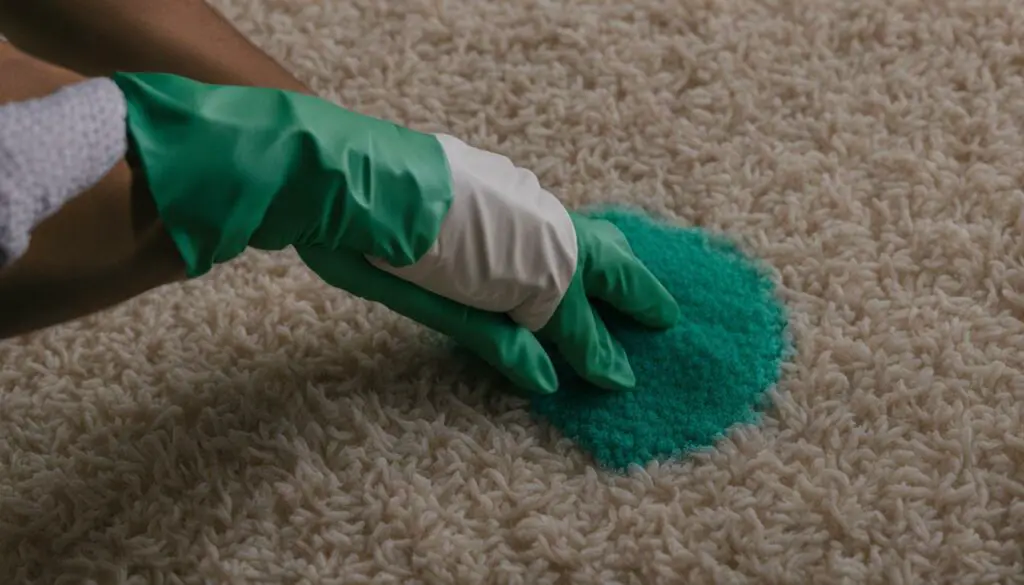
Mistakes to Avoid when Cleaning Cat Urine
While it’s important to take the right steps in dealing with cat urine, there are also some common mistakes to avoid:
- Avoid using ammonia-based cleaners, as they can actually make the odor worse. Cat urine contains ammonia, and using an ammonia-based cleaner can encourage cats to mark the same spot again.
- Do not use strong-smelling cleaning products or air fresheners to cover up the odor. This only masks the smell temporarily and can be overwhelming for both humans and cats.
- Ensure that you thoroughly clean not only the surface but also the underlying layers. Cat urine can penetrate deep into carpets, upholstery, and even wood floors, so thorough cleaning is essential to eliminate the odor completely.
Table: Comparing Cat Urine Cleaning Products
| Product | Features | Effectiveness | Price |
|---|---|---|---|
| Enzymatic Cleaner | Specifically designed for pet urine, breaks down urine molecules | High | $$ |
| Odor Remover Spray | Neutralizes pet odors, easy to use | Medium | $ |
| Homemade Vinegar Solution | Natural and cost-effective, helps neutralize odors | Low | $ |
| Baking Soda | Absorbs odors, easy to use | Low | $ |
Addressing Cat Odor in Your Home
To keep your home smelling fresh and free from cat odor, it’s important to identify the sources of the smell and take appropriate measures. Regular vacuuming is key to removing cat hair and dander from carpets, rugs, and upholstery. Use a vacuum cleaner with a HEPA filter to effectively trap allergens and odors. Additionally, groom your cat regularly to reduce shedding and minimize odor. Brushing your cat’s coat helps remove loose hair and prevents it from spreading around your home.
Another effective way to address cat odor in your home is by using air purifiers. These devices help remove pet dander, odor particles, and other allergens from the air, leaving your home smelling fresh. Look for air purifiers specifically designed for pet owners, as they often come with specialized filters that target pet-related allergens and odors.
It’s also important to maintain cleanliness in areas where your cat spends a lot of time. Wash blankets and cat beds regularly to eliminate any odors that may have absorbed into the fabric. Clean the food and water area daily to prevent the buildup of bacteria and odors. Consider using stainless steel bowls, as they are easier to clean and less likely to retain odors compared to plastic bowls.
In addition to these measures, it’s a good idea to regularly change furnace filters in your home. This helps remove any pet-related allergens and odors that may be circulating through your HVAC system. Opt for filters with a higher MERV rating for better filtration of small particles.
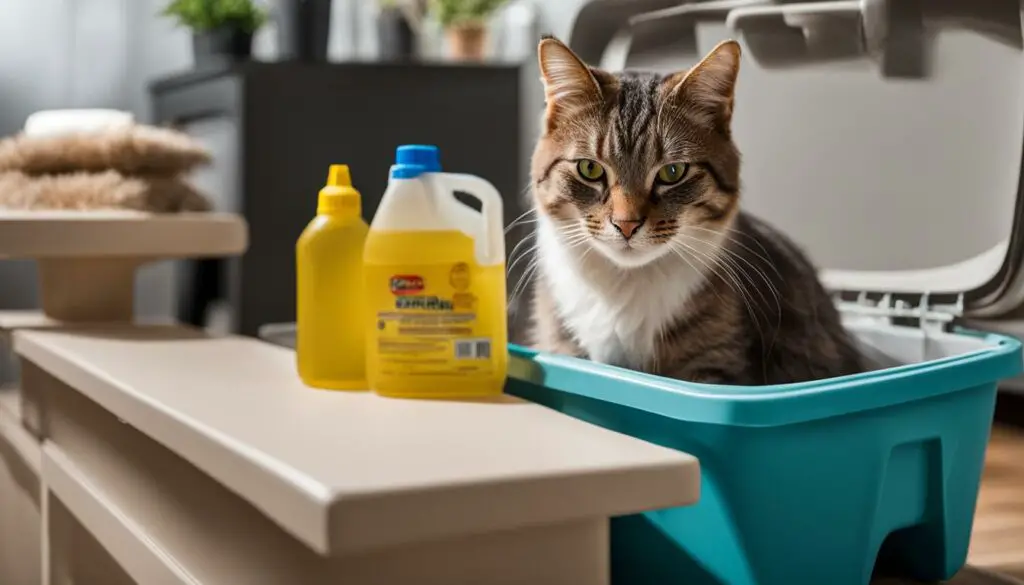
Catster Tip: Controlling Cat Smell
In order to effectively control cat smell in your home, there are several key steps you can take. By managing litter boxes, regularly cleaning your home, grooming your cat, using air purifiers and furnace filters, washing your cat’s items, and maintaining cleanliness in the feeding area, you can keep your house smelling fresh and free from cat odors.
1. Managing Litter Boxes: Litter boxes are one of the main sources of cat odor. Make sure to clean them regularly and consider using covered litter boxes to contain odors. Maintaining a proper litter box cleaning frequency and choosing the right type of litter are also important factors.
2. Regular Cleaning: Keep your home clean by vacuuming, dusting, and mopping regularly. This will help remove any pet hair or dander that can contribute to the smell. Pay extra attention to areas that your cat frequents, such as their favorite sleeping spots or play areas.
3. Grooming: Regularly grooming your cat can help reduce shedding and odors. Brush their fur to remove loose hair, bathe them as needed, trim their nails, and brush their teeth. This will not only keep them clean but also help control any unpleasant smells.
4. Air Purifiers and Furnace Filters: Use air purifiers with activated charcoal filters to help absorb and neutralize odors in the air. Additionally, regularly changing furnace filters will help prevent pet odors from circulating throughout your home.
5. Washing Cat Items: Regularly wash your cat’s bedding, blankets, toys, and other items they come into contact with. This will help remove any accumulated odors and keep them smelling fresh.
6. Cleaning the Feeding Area: Clean your cat’s food and water bowls regularly to prevent any lingering smells. Wash them with hot, soapy water and rinse thoroughly to ensure they are clean and odor-free.

By following these Catster tips, you can effectively control cat smell in your home. By managing litter boxes, regularly cleaning, grooming your cat, using air purifiers and furnace filters, washing your cat’s items, and maintaining cleanliness in the feeding area, you can create a fresh and pleasant environment for both you and your feline friend.
Conclusion
Eliminating cat odor from your home can be achieved by following these efficient tips. By maintaining cleanliness, managing litter boxes, regularly grooming your cat, and freshening up your home, you can keep your house smelling fresh and free from cat odors.
Cleanliness is key when it comes to eliminating cat odor. Regularly vacuuming, dusting, mopping, and washing fabrics help to get rid of pet smells and keep your home fresh. Additionally, cleaning your cat’s accessories such as bedding, toys, dishes, cage, and litter box on a weekly basis is important to prevent odors from spreading.
Grooming your cat regularly is another effective way to keep your home odor-free. Bathing, brushing, nail clipping, and tooth brushing help to keep your furry friend fresh and reduce any unpleasant smells they may bring into your home.
Freshening up your home can also help eliminate cat odors. Open your windows and doors regularly to let fresh air circulate, sprinkle baking soda on carpets to absorb smells, and use air neutralizers and masking scents to create a pleasant environment. Additionally, consider protecting your furniture from pet smells and choosing easy-to-clean rugs to minimize odors. By following these tips, you can enjoy a fresh-smelling home that is free from cat odors.
| Efficient Tips for Eliminating Cat Odor | |
|---|---|
| Maintain cleanliness | Regular vacuuming, dusting, mopping, and washing fabrics |
| Manage litter boxes | Choose the right litter, clean frequently, use a covered box |
| Regular grooming | Bathing, brushing, nail clipping, tooth brushing |
| Freshen up your home | Airing out, sprinkling baking soda, using air neutralizers |
About the Author

Hi there! I’m Emily, a passionate pet lover and experienced pet care specialist with over a decade of experience. I have a deep understanding of how to keep your home clean and odor-free, even with furry friends around. Throughout my career, I have worked with various animals, including cats, dogs, and small mammals, providing them with the best care possible.
My love for animals started at a young age, and it has only grown stronger over the years. I believe that pets are an important part of our lives, and it is our responsibility to ensure their well-being and happiness. Through my work, I aim to help pet owners create a harmonious living environment where both humans and pets can thrive.
I am excited to share my knowledge and expertise with you, providing practical tips and advice to help you keep your house smelling fresh and clean, even with a cat in the mix. By following the strategies outlined in this article, you can enjoy the companionship of your feline friend without worrying about any unpleasant odors. Let’s create a happy and odor-free home for you and your cat!
Additional Tips for Minimizing Pet Odors
As a pet owner myself, I understand the importance of keeping your home smelling fresh and clean. Here are some additional tips to help you minimize those unwanted pet odors:
1. Use Natural Odor Absorbers
Instead of relying solely on air fresheners or artificial sprays, try using natural odor absorbers such as baking soda, activated charcoal, or vinegar. These substances can help neutralize and eliminate odors without introducing harsh chemicals into your home.
2. Implement Good Ventilation
Proper ventilation is key to maintaining a fresh-smelling home. Open windows regularly to allow fresh air to circulate and remove stale odors. Consider using ceiling fans or air purifiers to improve air circulation and filter out pet odors.
3. Keep Pet’s Bedding Clean
Regularly wash your pet’s bedding, blankets, and even their favorite toys to remove any lingering odors. Follow the manufacturer’s instructions for cleaning to ensure that you maintain the quality of their belongings while eliminating odors effectively.
4. Address Accident Spots Immediately
If your pet has an accident, it’s important to clean it up promptly and thoroughly. Use pet stain and odor removers specifically designed for removing urine or feces stains. These products are formulated to eliminate odors at their source, preventing them from lingering in your home.
By implementing these additional tips along with the strategies mentioned earlier, you can create a clean and fresh-smelling environment that both you and your pets can enjoy. Say goodbye to those unwanted pet odors and hello to a pleasant home!
Additional Tips
How can I keep my house free from the smell of cats?
By following a few simple steps, you can effectively eliminate unwanted cat odors in your home. These include maintaining cleanliness, grooming your pet, and properly cleaning their accessories.
What are some tips for regular cleaning to eliminate pet odors?
Regular vacuuming, dusting, mopping, and washing fabrics are important tasks that help combat the smell of pets in your home.
How does grooming your pet contribute to keeping your home smelling fresh?
Regularly cleaning and grooming your pet, including bathing, brushing, nail clipping, and tooth brushing, can greatly help in keeping your home smelling fresh.
How should I clean my pet’s accessories to prevent cat odors?
It is important to regularly clean all of your pet’s accessories, including washing their bedding, toys, dishes, cage, and litter box on a weekly basis.
What can I do to effectively manage the litter box and minimize cat odor?
Tips for managing the litter box include having at least one litter box per cat, choosing a well-sized box with a cover and filter, finding the right litter, adding baking soda, scooping daily, and placing the litter box in a secluded area.
How can I freshen up my home to eliminate cat odors?
Freshening up your home can be done by opening windows and doors regularly, sprinkling baking soda on carpets, using air neutralizers and masking scents, changing air filters, protecting furniture from pet smells, and choosing easy-to-clean rugs.
What should I do if all else fails to eliminate strong cat odors?
If all else fails, sealing floors and walls, painting, and calling in professionals may be necessary to eliminate strong pet odors from your home.
How can I manage cat odor from litter boxes?
To manage cat odor from litter boxes, it is important to choose the right litter, clean the litter box frequently, use a covered litter box, and consider a diet change if necessary.
What can I do to address cat urine odor?
It is important to clean urine stains promptly and thoroughly, use odor removers, and clean up vomit and feces properly to eliminate their smell.
How can I address cat odor in my home?
To address cat odor in your home, it is important to identify the sources and take appropriate measures such as regular vacuuming, addressing cat breath and grooming, using air purifiers, cleaning furnace filters, washing blankets and cat beds, and maintaining cleanliness in the food and water area.
What is the Catster tip for controlling cat smell?
The Catster tip for controlling cat smell includes managing litter boxes, regular cleaning, grooming, using air purifiers, cleaning furnace filters, washing cat items, and maintaining cleanliness in the feeding area.
How can I effectively keep my house from smelling like a cat?
By following these efficient tips, you can effectively keep your house from smelling like a cat. Maintaining cleanliness, managing litter boxes, regular grooming, and freshening up your home are key strategies to eliminate cat odor.






